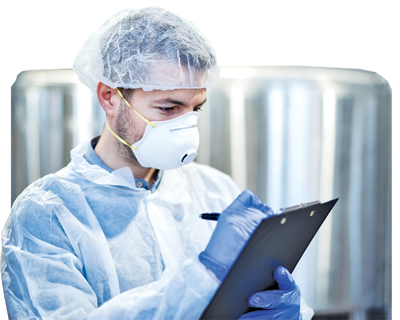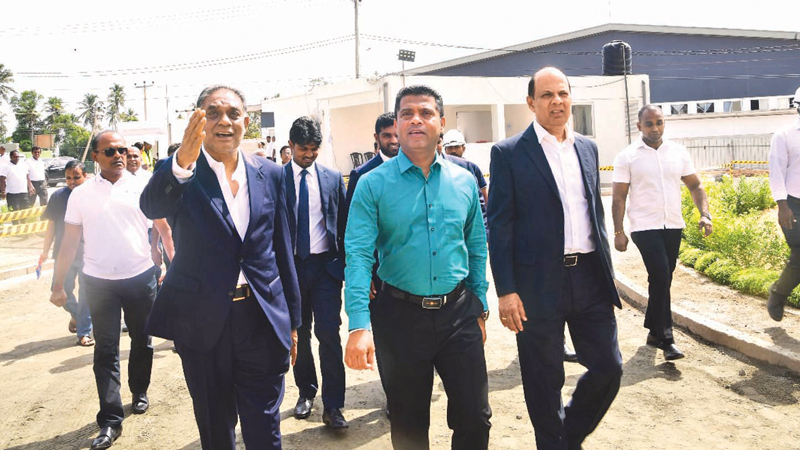 Sri Lanka is on the brink of a transformative leap in its healthcare and pharmaceutical sectors with the construction of the country’s largest pharmaceutical manufacturing facility now nearing completion. The state-of-the-art project, spearheaded by Synergy Pharmaceuticals Corporation (Pvt) Ltd., was recently inspected by the Minister of Health and Mass Media, Dr. Nalinda Jayatissa, who said that the facility is a “revolutionary milestone” in the country’s drive towards pharmaceutical self-sufficiency.
Sri Lanka is on the brink of a transformative leap in its healthcare and pharmaceutical sectors with the construction of the country’s largest pharmaceutical manufacturing facility now nearing completion. The state-of-the-art project, spearheaded by Synergy Pharmaceuticals Corporation (Pvt) Ltd., was recently inspected by the Minister of Health and Mass Media, Dr. Nalinda Jayatissa, who said that the facility is a “revolutionary milestone” in the country’s drive towards pharmaceutical self-sufficiency.
Located in the rapidly developing Bingiriya Export Processing Zone, this 15-acre complex is the centrepiece of a USD 120 million investment that promises to change how Sri Lanka manufactures, supplies, and distributes medicines.
A regional giant in the making
Set to become the largest pharmaceutical production hub in South Asia, the facility aims to manufacture a wide range of essential and high-value medications. These include Oral Solid Dosage (OSD) forms, vaccines, hormonal treatments and cancer drugs, all produced using cutting-edge technologies that meet the highest international standards.
Speaking after the inspection, Minister Jayatissa said that the new facility will be a landmark in Sri Lanka’s medical infrastructure. “This isn’t just about manufacturing drugs. It is about securing our health sovereignty,” he said. “In a few years, medicines made here will be available across Government hospitals and in the market, greatly reducing our dependence on imports.”
The factory will also house South Asia’s largest pharmaceutical research and development laboratory, enabling the country to pioneer drug innovation and respond rapidly to public health needs.
Currently under construction by Senura Civil Engineering (Pvt) Ltd., the facility is being built to global
pharmaceutical production standards. The Health Minister inspected the manufacturing floors and the staff accommodation complex, which will house over 700 employees. Once fully operational, the site is expected to generate over 2,500 direct jobs in the region.
“The scale of this operation, coupled with its focus on quality, makes this one of the most significant industrial undertakings in the country,” the Minister said.
Also present during the visit were Synergy Pharmaceuticals Chairman Ravi Wijeratne, Managing Director Rohan Wijesuriya, Chief Operating Officer R. Kabadaji (India), BOI Chairman Arjuna Herath, and senior officials of the Drugs Regulatory Authority and the Bank of Ceylon.
Solving a long-standing crisis
Sri Lanka has historically depended on imported pharmaceuticals to meet more than 80 percentf its domestic needs, often from India and other Asian countries. With a health system under pressure from both economic constraints and fluctuating global supply chains, this dependency has often resulted in shortages, especially of critical drugs.
Minister Jayatissa acknowledged these difficulties, adding that despite the Government allocating over Rs. 200 billion annually for medication, delays in supply and availability continue to plague the public health system.
“No matter how much we invest, if we cannot ensure timely and sufficient supply, the people suffer,” he said. “Local production is the answer to this chronic vulnerability.”
The Health Ministry has now set a target of fulfilling 95 percent of the public hospital system’s pharmaceutical requirements through a consistent supply by next year, and the Synergy Pharmaceuticals facility is expected to play a central role in achieving that goal.
Strategic importance of pharmaceutical sovereignty
The Covid-19 pandemic and subsequent global supply disruptions served as a wake-up call for many nations, including Sri Lanka. The fragility of international pharmaceutical supply chains, often influenced by geopolitics, logistics constraints, or raw material shortages, underscored the importance of domestic production capacity. Industry analysts have said that for developing nations, building a robust pharmaceutical base is not just an economic choice but a strategic necessity. Local production reduces exposure to currency fluctuations, supply bottlenecks, and foreign policy tensions, while boosting national resilience during health emergencies.
 Sri Lanka’s move to anchor its pharmaceutical future in facilities such as Synergy Pharmaceuticals’ is in line with a broader trend across the Global South, where countries like India, Bangladesh, and Indonesia have already taken decisive steps toward pharmaceutical self-reliance.
Sri Lanka’s move to anchor its pharmaceutical future in facilities such as Synergy Pharmaceuticals’ is in line with a broader trend across the Global South, where countries like India, Bangladesh, and Indonesia have already taken decisive steps toward pharmaceutical self-reliance.
Quality control remains one of the most critical components of pharmaceutical manufacturing. Minister Jayatissa said that the Synergy facility has committed to adhering to strict international guidelines, likely including GMP (Good Manufacturing Practice) and World Health Organization (WHO) prequalification standards. A vital step if Sri Lanka’s drugs are to compete globally and be accepted into international markets.
“This is not just about meeting our needs. It’s about ensuring that what we produce here is good enough to be used anywhere in the world,” he said.
The Minister said the Government’s intention is to continue attracting high-quality investors to build a globally competitive pharmaceutical manufacturing ecosystem. According to the Minister, Sri Lanka aims to export locally produced pharmaceuticals to the international market.
On June 1, Sri Lanka despatched its first consignment of cardiac medicines, valued at Rs. 45 million, to Peru. Delivered by Celogen Lanka (Pvt) Ltd., the shipment signalled the Government’s inteniont to support local exporters.
Going beyond commercial success, the move underscores Sri Lanka’s emergence as a global pharmaceutical contender. The Ministry of Health said that plans are already under way for further exports, with consignments to the Philippines next in line.
A vision for the future
The Minister of Health said: “This facility is not just an investment in bricks, mortar, and machines. It is an investment in the future health of our nation. Our goal is that in two years, Sri Lankans will no longer face drug shortages or delays. This is the beginning of a new era.”
He also called on the public and private sectors to maintain momentum. “Pharmaceutical security is national security. And we’re ready to partner with anyone who shares that vision.”
With the scheduled launch of manufacturing operations by the end of this year, the Synergy Pharmaceuticals plant represents more than just an industrial milestone.
If successful, it will be a symbol of Sri Lanka’s commitment to healthcare resilience, innovation, and self-reliance in an increasingly uncertain global landscape.







